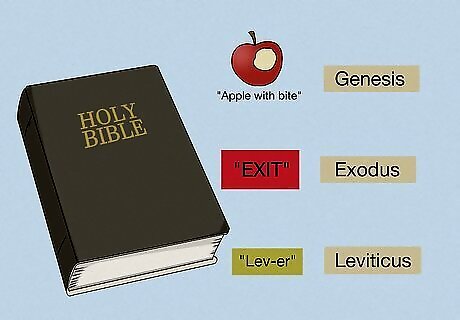
views
Recalling the Names of the Books

Make a reference sheet to help you learn the names of each book. A helpful way to get familiar with the names and order of the books in the Bible is to make a visual aid. Take a piece of paper, and write out the order of the books for both the Old and New Testament. Keep this in simple list format so you can easily scan the sheet. Then, use this reference as you practice learning the names. Having an outline of the book titles can help you keep track of the order of the books overall.

Find a song to help you remember the books of the Bible. An effective way to remember the order of the books and their names is to use a song or rhyme. Search online for “books of the Bible songs,” and choose your selection based on personal preference. There are lots of genres and types to choose from, such as rap, rock, and nursery rhymes. Listen to the song frequently, and it can help you learn the books of the Bible. You can find particular songs for the Old and New Testaments.

Search online to find Bible study games to help you practice. Search for something like, “Books of the Bible study games,” to help you find tools to use. There are countless options, including online games, activity ideas, and printable study tools. Using study games is an easy and fun way to practice your skills and see what you remember. To play games online, visit websites like https://www.bibleactivitieszone.com// and https://www.adventurebible.com/.

Have a friend read over a passage and guess which book it belongs to. This is a great way to test your memory for each book overall. Your friend can read a full passage or a few lines, and then try your best to recall what the name of the book is. Do this for several books, spanning the Old and New Testaments Whatever books you can't remember is a good indication of what you should practice more.

Make a list of visual mnemonics to help you recall each book. Mnemonics is a study tool that can improve memory and help you retain information. First, make a list of each book in both the Old and New Testament. Then, you can either come up with your own mnemonic memory aid or search online to get ideas. Write the mnemonic in another column next to your list of books so you can easily keep track. For example, write out “Genesis,” “Exodus,” and “Leviticus” in a list so they have their own row. Then, you can write “Apple with bite” next to “Genesis,” “EXIT,” next to “Exodus,” and “Lev-er” next to “Leviticus” to help you remember the names of each book.

Practice learning the names of the books every day. Practicing regularly is required if you want to learn the books of the Bible. If your schedule permits it, review the names of the books for 20-30 minutes each day. You can play a game, read over a passage independently, or collaborate with friends or family. If you can't practice every day, aim for at least 5 times a week.
Learning Each Book of the Bible

Read the Old Testament to familiarize with the Hebrew Bible. The Old Testament consists of 39 books total, including Genesis, Exodus, Leviticus, Numbers, and Deuteronomy. This is the main scripture for the Jewish faith. In this book, God is seen as the “one true God,” and the problem of evil plays a major role. The Old Testament is slightly harder to read compared to the New Testament because of its older language and phrasing.

Review the New Testament to learn the Christian Bible. The New Testament has 27 books, including Matthew, Mark, Luke, John, Acts, James, and Romans, to name a few. The New Testament mainly focuses on the teachings of Jesus Christ through the perspective of his Disciples and followers. Since it was written more recently, it has a more direct tone and is easier to read.

Set aside time each day to study the books of the Bible. If your schedule permits it, try to read the books of the Bible every day. You can choose 1 passage each day to read and work with, for instance. Then, over time you’ll familiarize with each of the books. You can read the Bible for 30 minutes before you go to sleep. If you can’t find time to study each day, that’s okay. Aim to read a passage at least 2-3 times a week if you can.

Read the passage out loud to help you memorize it. As you study the Bible, you may find it easier to remember the words if you hear them aloud. Follow along in your book, and recite the passages to yourself. In particular, this is a good idea if you want to memorize the entire Bible to recite in church. Try recording yourself while reading the passage and listen to it again later. This way, you can see how accurate you were and find places where you can improve your memorization. Hearing the passage again also helps you remember it.

Mark the text with a pen or highlighter to help you study. If you own the Bible you’re reading, use a writing device to notate important plot elements and things you particularly resonate with. This helps you focus as you study, and it helps you easily look back over your passages for a quick refresher. Make personal notes or comments in the margins with a pen or pencil, and use a highlighter to indicate phrases you think are important or relevant. If you don't own the Bible, you can use sticky notes instead of writing directly onto the pages.

Try downloading an app to help you learn each book. Go to your smartphone’s app store, and search for “Bible study apps” or something similar. Then, select a free or paid option, based on your preferences. There are numerous apps that can help you study, memorize, and implement the books of the Bible. You can easily scroll through each book of the Bible, read passages, and make notes using some app types. You can also find Bible study game apps to help you practice.

Find a Bible study group so you can practice with others. You can find a church group, ask some friends, or search for a local meet up. Search online or go to your local library. This way, you can read and review passages together to help each other learn. For example, you can take turns reading passages aloud and identifying which book it belongs to. You can all play a group study game, such as Jeopardy.




















Comments
0 comment